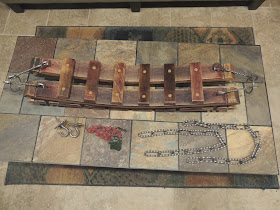Four staves of approximately the same width are chosen for the rack and dried.
It's now time to sand the staves down to even them out and remove any of the roughness. I use a belt sander with a 40 grit paper for the initial pass.
The next step is to take a dual action sander with 80 grit paper and sand all four pieces. Hand sanding with the 80 grit helps get to the portions that are not accessable. A final hand sanding with 180 grit completes this step.
Two of the staves are measured and marked where the holes will be drilled. This is where the glasses will be hung.
With a drill press fit for a king, seven 1" holes are drilled in the two maked staves.
Each of the holes is routed front and back using a round-over bit.
With a table saw, slots are cut and the round-overbit is used once again to smooth the cut. This is where the glasses will slide in and out. All four staves are stained with a medium oak, red oak, or cherry finish.
An Earth friendly polymerized tung oil from Vermont is used first as a sealer, then as a penetrating oil. This multiple hand rubbed process may take multiple applications. The surfaces that would otherwise be hard to reach after assembly are coated at this time.
Cross bars are cut form additional staves and the assembly process begins with the lower two staves.
The upper staves are assembled next.
Once the structure is assembled, an additional six cross braces are numbered, measured, and cut to length. They then have 1/2" holes countersunk into each side. This will allow the braces to be attached to the rack.
Each of the six braces are dual action sanded, then hand sanded. The bottom and sides are stained and coated.
Oak plugs are created using a 1/2" dowel.
The cross braces are glued and screwed to the rack, then the oak plugs are glued into the countersunk holes above the screws. Once the glue is dry, the dowels are sanded flush with the braces and the upper portion is stained. All untreated portions of the rack not addressed prior are sealed and coated with the tung oil to create a hard durable finish.
Twisted bar chain is cut to length using a metal saw and all hardware including all hooks and rings are sandblasted and powdercoated with a platinum iron finish. This process uses a positive and negative charge to attact the powder to the part.
All metalwork is carefully placed in the powdercoating oven and heated to 400 degrees for 1/2 hour. The powder melts at this temperature. Once cooled, this process creates a finish that is 10x more durable than paint.
The eye hooks are attached and the finished rack is ready to be hung and enjoyed using the ceiling hooks provided. Each rack holds 14 glasses and 5 to 7 bottles.



















No comments:
Post a Comment